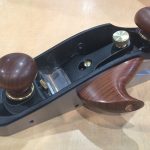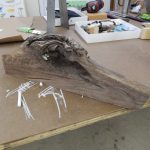We may receive a commission when you use our affiliate links. However, this does not impact our recommendations.
There I was, on my butt halfway up the hill on my seventh try, tackling what I refer to as the single-track-mountain-bike hill of death. The throbbing from the inevitable bruise on my butt beginning its rhythmic mocking chant only to be quickly magnified by the kid behind me on a K-Mart BMX bike who had to literally ride over me to avoid crashing himself.
“Why’d you stop peddling.” He yelled at me once I’d managed to carry my bike up the rest of the hill.
“I didn’t, I crashed.”
“You crashed cause you stopped peddling,” snarked the kid, followed by the condescending, “Nice Bike.” As if I didn’t deserve to own such a nice machine.
My bike was a Proflex 856 with aftermarket coil over shocks, Girvin springer front forks, XT gearset, superlight rims (front now bent from either crashing or being ridden over) and new tires specifically bought to help me tackle this hill. I was proud of that machine, having purchased it in my late 20s by selling my motocross bike and dumping the entire amount into this new hobby with dreams of getting back into shape and maybe a little competition
Doesn’t it suck when whippersnappers like that BMX rider are right? That bike was wasted on me.
I’d tried to buy skill via equipment. Isn’t that what manufacturers preach all the time? This gizmo or that is all you need to be able to do … And the pros swear that the doodad will cut time, add control, leap tall buildings, and make the ladies swoon. Thousands of dollars spent to compensate for less time in the saddle. Woulda been better off working a few hours less overtime, saving that money and spending those extra hours on the trail enjoying the hobby.
I did the same thing again when I got into golf by buying a set of clubs marketed to help my slice, and drivers guaranteed to go farther straighter, along with a putter for accuracy. And after a few weeks at the driving range getting accustomed to them, sure enough my slice improved, my drives when farther, and three putting became rarer.
And then some old golfer we picked up at the course to make a foursome commented, “do you really think it was those clubs or the little practice at the range that made those improvements?”.
Doesn’t’ it suck when old farts like that point out the obvious stuff you’re blind too?
OK, raise your hand if you’ve ever been similarly motivated to part company with hard-earned dinero? A push-button fix for a skill you lack. I’d like to snark that was the GenX way, but I’m quite sure it’s a time-honored technique
It’s a strange mentality that seems to permeate hobbies – that as beginners, we can buy something that’ll make us better at a skill without having yet learned said skill.
I’m getting to the point now where people are asking “should I buy this” and “what do you think of that?” Maybe it’s the old motorcycle salesperson in me, maybe it’s perspective from the little bit of experience I have under my belt, maybe it’s that money is much dearer in your late 40s compared to your early 30s, but my first thoughts are, “Why does this person want this? Is it to learn a skill or avoid learning a skill? Is it to get something done or avoid having to do something?”
You see, if you’re wanting to get satisfaction in tool purchases, motivation matters. It is possible to buy a good tool for the wrong reason and be disappointed in the long run. I think back to all the tools I regret buying; the reasoning behind those purchase usually comes down to avoiding learning something. The $200 dovetailing jig (not including bits and routers), used once and put up to collect dust. The mortising attachment to make a drill press do what it shouldn’t. The handplane fence to hold the tool at 90°. All bought to avoid a little learning stuff which in the long run I ended up having to learn anyways.
And what’s worse is that hindsight has shown me time and time again these skills I was avoiding really didn’t take that much time or effort to learn. But when you don’t know, you just don’t know.
Of the types of tools you’ve been most dissatisfied with in your woodworking career, can you say in hindsight that it was the tool or the unrealistic expectations brought about by poor purchase motivations?
Here are some supplies and tools we find essential in our everyday work around the shop. We may receive a commission from sales referred by our links; however, we have carefully selected these products for their usefulness and quality.











Strongly agreed with all your points here (I do pretty well on an old 1991 Fat City Yo Eddy! hardtail, riding past guys on their full suspension machines).
However, I have found a tool that has come darn close – a festool Domino. The ability to just cut to length, make a pencil line and go is pretty stunning, and no telltale marks to suggest it isn’t a full mortise and tenon…. I don’t have any other Festool devilspawn tools, but that one sure is nice.
Shawn, Having owned an 856 you owe yourself the favor of moving up to a bike that works. The design of the 856 fork has the travel moving toward the frame in an arc, increasing the steering angle until the front wheel acts like a wobbly caster. This design never panned out and has gone from the market. A really nice hardtail 27″ bike with a fatty tire, and a decent fork and you will be amazed at the confidence you gain. Confidence in clearing an obstacle is more than half the battle. I equate this to not having the latest gadget, but more like a chisel with good steel, and kept sharp! You can’t cut without an edge! So having bought a tool or two I have discarded and don’t use is part of the journey, which is never linear, but full of trials and errors!
There are cross over points in sports and hobbies where better quality tools or equipment will improve the obtainable results of the student or struggling craftsman seeking to improve. As a Professional ski instructor I’ve seen where a simple change from poor equipment was the difference is placing in the middle of the pack and being in the top ten. I’ve seen where I change the student from a pare of poorly designed boots to a pare of better quality boots was the difference between being frustrated and being able to ski properly and have fun and enjoy your day on the slopes.
There is a time when the equipment / tools don’t make a difference in the end results, and there is a time when the skill and practice are there and the difference between poor or good or great is the quality of the tool. It can make a difference.
Amen and Amen. Saw myself of yesteryear in the examples cited. What do they say about hindsight. Well written, thanks for the trip down memory lane and lessons learned.
My father has long said that people try to buy their skill with their next tool purchase… and it’s not just with tools as Graham points out. I’ve seen it with bicycles, tools, cars, motorcycles, and guns. I’ve got one associate who owns really nice bicycles, guns, and other things but functions at a novice level with all…
I was blessed with the opportunity to work in the Gunsmith Shop at Colonial Williamsburg, VA when they had a really strong crafts department. There I associated with fine craftsmen who were always trying to learn more and develop more skill… after being there for a few months I figured out that it was really an academic environment.
Not being particularly knowledgeable of woodworking at the time, but needing to make handles for turn screws I stopped by the cabinet shop for help. There Mac Headley set me up on a spring pole lathe and taught me how to use it. Initially, Roy Underhill was a guy with whom to drink beer — his wife and my housemate were friends and took turns babysitting the kids. George Wilson, instrument and tool maker, always had something interesting to show and discuss. Lynton McKenzie, premiere engraver of “best” guns, visited one time and gave us a talk and demonstration on gun engraving. Oh course the gunsmiths (Gusler, Brumfield, Laubach, Suiter, and Wagner) taught me a lot too!… I learned from all of them and there was no electricity and no skill-in-a-box gizmos involved!
Skill… Lynton McKenzie’s praise of Wallace Gusler’s fine engraving with “a sharpened nail” left an impression. This praise was coming from a guy who worked on $100K+ guns.
RE bicycles, some of us still have the high performance bicycles we got when we were much younger… My Specialized Epic is more bike than I “need” now but it was about right for off-road when I got it. My around town bike is a 1963 Schwinn Racer 3 Speed… an “easy bike” that doesn’t require cleated shoes, padded shorts, and gloves while riding and I can actually see what is going on around me in traffic due to its upright riding position. It is a far cry from the Reynolds 531, Campagnolo, tubular tired road racing stuff I regularly rode in the ’70s and ’80s… For my long distance touring I have a dedicated touring bike… Surly Long Haul Trucker. Like with woodworking, having the right tool for the job and the skill to use it is important in cycling too though you obviously can make due.
Then there is the “less is actually better” department. My father taught me to use vernier calipers 56 years ago, then gave me his Mitutoyo calipers and bought himself a new one. I’ve used those Mitutoyo all of my 55 year work life, and then I took them into the wood shop. Trouble started immediately, it doesn’t take much wood dust to kick the dial off 0. It got to the point I just didn’t trust dial calipers anymore so I looked around for a vernier set. Wow! A good set of SAE vernier calipers is as easy to find as the proverbial hen’s teeth. I finally settled on a dual reading set made by Fowler at a fraction of the cost of the Mitutoyos or Starrets. No more mistrust in the readings though. It can’t run off the rack because it’s just a slide, no teeth. Your arithmetic will get a lot quicker too.
You make some very good points. I have some of those unused or little used tools. If you develope the skill set you can use almost any thing to get the job done. But it’s hard to resist all the advertisements and magazine posts that “sell” you on the next must have tool. Of course you need the left handed smoke shifter and store it next to the sky hook. I am trying to clear out those unused tools that I don’t really need, and never did. However, many good tools I did buy help make a significant number of operations easier. I would not give up my tite-mark in a hundred years. I love the accuracy of my Starret calipers. I have 4 block planes (I like block planes) and I would not give one of them up. Each does a few things better than the others. Sure, I could survive with just one low angle block plane, but as I near 70, why? However, I can make someone a good deal on a Delta table saw Cast iron tenoning jig (I made my own out of wood, better faster cheaper, etc etc), yes I have the same mortise set up for the drill press and used it a lot at one point, but what a struggle! How about the over priced dovetail jig that I used once 20 years ago, I’ll even throw in a few router bits (it’s faster to cut dovetails by hand than set up the jig). So, I agree, but while you can get by with a few basic tools, if you are fortunate enough to afford some good tools, by all means, life is short.
Nicely done. Buying success is this field is not easy. Nothing we purchase has free will, we have to learn skills and practice. I did some MX for a couple of years too. At a practice day a guy turned up on a pre ’65 twinshock beast of a bike. I think he passed me and everyone else in short order.